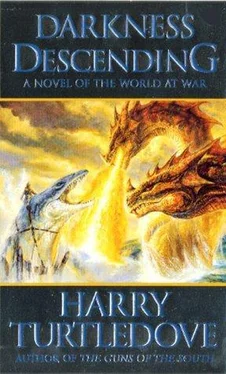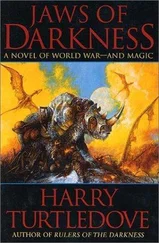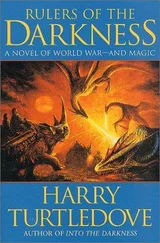Harry Turtledove - Darkness Descending
Здесь есть возможность читать онлайн «Harry Turtledove - Darkness Descending» весь текст электронной книги совершенно бесплатно (целиком полную версию без сокращений). В некоторых случаях можно слушать аудио, скачать через торрент в формате fb2 и присутствует краткое содержание. Жанр: Старинная литература, на английском языке. Описание произведения, (предисловие) а так же отзывы посетителей доступны на портале библиотеки ЛибКат.
- Название:Darkness Descending
- Автор:
- Жанр:
- Год:неизвестен
- ISBN:нет данных
- Рейтинг книги:3 / 5. Голосов: 1
-
Избранное:Добавить в избранное
- Отзывы:
-
Ваша оценка:
- 60
- 1
- 2
- 3
- 4
- 5
Darkness Descending: краткое содержание, описание и аннотация
Предлагаем к чтению аннотацию, описание, краткое содержание или предисловие (зависит от того, что написал сам автор книги «Darkness Descending»). Если вы не нашли необходимую информацию о книге — напишите в комментариях, мы постараемся отыскать её.
Darkness Descending — читать онлайн бесплатно полную книгу (весь текст) целиком
Ниже представлен текст книги, разбитый по страницам. Система сохранения места последней прочитанной страницы, позволяет с удобством читать онлайн бесплатно книгу «Darkness Descending», без необходимости каждый раз заново искать на чём Вы остановились. Поставьте закладку, и сможете в любой момент перейти на страницу, на которой закончили чтение.
Интервал:
Закладка:
“You can’t do that,” one of the Jelgavans exclaimed. Several ofTalsu’s countrymen nodded. Somebody else said, “That arch has stood there for more than a thousand years. Knocking it down would be an outrage!” More Jelgavans nodded.
“Why do they want to knock down the arch?” Talsu asked somebody at the back of the little crowd. “It’s not doing anything to anybody.” He consciously noticed it for only the third or fourth time since coming home to Skrunda after the Jelgavan defeat the year before.
Before the fellow could answer, one of the Algarvians did, in Jelgavan accented but clear: “We can destroy it, and we will destroy it. It is an insult to all the brave Algarvians of ancient days, and to the Algarvic kingdoms of today: to Algarve, to Sibiu, and even to Lagoas, that is misguided enough to be our foe.”
From the middle of the crowd, a woman called, “How is it an insult if it tells the truth?”
“Algarvians went on to triumph,” the redheaded officer replied. “That proves all the vile things this Kaunian tyrant said about our ancestors were false. They have stood too long. They shall stand no more.” He turned to a mage. Looking over the people in the crowd, Talsu saw that eggs had been affixed to the pillars upholding the arch. All of a sudden, he didn’t want to stand right there.
The oil seller didn’t like his shop standing right there, either. Bursting out of it, he cried, “You people are going to drop a million tons of rock right through my roof!”
“Calm yourself,” the officer said, a startling bit of advice from an excitable Algarvian’s mouth. “Buraldo there is very good at what he does, very careful. You should come through fine.”
“And if I don’t?” the oil seller shouted. The Algarvian shrugged one of his kingdom’s extravagant shrugs. The oil seller shouted again, wordlessly this time.
Talsu shouldered his way through the crowd. A couple of Algarvian soldiers swung their sticks in his direction. They were only alert, though, not dangerous. He’d seen the difference on the battlefield. Holding up the trousers, he said, “Before you do whatever you’re going to do, can I get by to deliver these?”
“Aye, go on,” the officer said, and waved him through witli a laugh. He was glad of the arch’s shade against the summer sun; that was about as much attention as he usually paid it. More Jelgavans stood on the far side, some of them also grumbling about what the redheads were on the point of doing to the monument. He pushed his way past them and up the street.
“How can you be so uncaring?” a woman with yellow hair like his demanded.
“Lady, I don’t want the redheads to knock it down, either,” Talsu answered. “But I can’t do anything about it, and neither can you. If you have the time to stand around and moan, fine. Me, I’ve got work to do.”
She stared at him. By the cut and cloth of her clothes, she had more money than he. A tailor’s son, he could make a good guess at how much anyone made by what he wore on his back. These days, her wealth only meant the Algarvians could steal more from her than from Traku and his family.
Behind Talsu, the redheads started shouting, “Back! Everyone back! If you don’t go back, it’s your own cursed fault!”
“Shame!” somebody shouted. One by one, the crowd of Jelgavans took up the chant: “Shame! Shame! Shame!”
If the Algarvians felt any sense of shame, they didn’t let it stop them from doing what they had orders to do. Talsu hadn’t gone more than another few steps when a roar of bursting eggs made him want to dive for cover--again, reflexes honed in the field. An instant later, chunks of masonry thundered down like an avalanche in the mountains.
He turned to see what the redheads had wrought. Wind from the falling marble rustled his hair. The familiar square shape was gone. A cloud of dust kept him from seeing any more than that. When the dust settled, the street would be as unfamiliar to the eye as his lower jaw might be to the tongue after losing a couple of teeth. No one was shouting “Shame!” any more. He wondered if the collapse of the arch had caught any Jelgavans in it, or, for that matter, any of the Algarvian soldiers. He shrugged. He’d find out on the way back. Delivering the trousers came first.
Silver jingled in his pockets as he headed home. By then, the dust was gone, and so was the arch. The Algarvians had been clever about dropping it; the marble lay in the street, but did not seem to have wrecked the houses and shops nearby. Talsu couldn’t see the oil-seller’s place, which lay on the far side of that great pile of rubble. Small boys had already started playing king of the mountain on top of it.
Their game did not last long. The Algarvian officer who spoke Jelgavan shouted, “Get off!” He followed that with some choice colloquialisms that set the children giggling as they scampered down. Then, to Talsu’s dismay, the officer and his soldiers (none of whom seemed to be missing) started pulling men off the street to get rid of the hill debris. One of the troopers nabbed him before he could make himself scarce.
He called, “Is this a paying job?” to the officer.
After a moment, the Algarvian nodded. “Aye, we’ll make it so.”
For the rest of the day, Talsu carried baskets of broken marble under the broiling summer sun. He dumped them into freight cars on the ley-line caravan that could get nearest the arch. That meant going halfway across town; people hadn’t known about ley lines in the days of the Kaunian Empire, and so hadn’t set their big buildings near them. The Algarvians didn’t stop him when he went into a tavern to buy a mug of ale, but one came in after him to make sure he didn’t linger or slip out the back door. He muttered curses under his breath; he’d had something like that in mind.
As evening twilight fell, he lined up to get his pay. He was worn and battered. Bruises covered his legs; he walked with a limp because a stone had done its best to smash his right foot. He had a couple of mashed fingernails, too, and half a dozen cuts and scrapes on his hands. “By the powers above, we earned whatever they give us,” he said.
When he got to the head of the line and held out an abused hand, the Algarvian officer slapped a couple of shiny new coppers into it. They bore the sharp-nosed image of King Mainardo, King Mezentio’s brother and now, by grace of Algarve, lord of Jelgava. Talsu looked from them to the redhead. “Go on,” the officer snapped. “Go on, and count yourself lucky you’re getting anything.”
Talsu stared at the coppers. They might have paid for an hour’s labor. Most of a day’s? He shoved them back at the officer. “Keep ‘em, pal,” he said. “Looks like you need ‘em worse than I do.”
“Do you know what I could do to you?” the Algarvian demanded.
“It might last longer than what you just did, but it couldn’t hurt much more,” Talsu answered with a shrug. “You had a chance to make people like you--like you better than our own nobles, anyway. This isn’t how you go about it.”
“Like us? What difference does that make?” the redheaded officer asked in surprise. “All that matters isthat you obey us.” He offered Talsu the coins once more. “Take them. You earned them.”
“I earned six times that much,” Talsu said, and walked away. He waited for the Algarvian to order him seized. It didn’t happen. He scurried around the first corner he came to, trembling from fatigue and reaction both. He’d been a fool to talk back to the occupiers. He’d got away with it, but that made him no less a fool.
“Where have you been?” Laitsina, his mother, cried when he came into the shop above which the family lived and slept. Then she got a good look at him and cried out again, this time in horror: “And what were you doing while you were there? Have the Algarvians beaten you with sticks?”
Читать дальшеИнтервал:
Закладка:
Похожие книги на «Darkness Descending»
Представляем Вашему вниманию похожие книги на «Darkness Descending» списком для выбора. Мы отобрали схожую по названию и смыслу литературу в надежде предоставить читателям больше вариантов отыскать новые, интересные, ещё непрочитанные произведения.
Обсуждение, отзывы о книге «Darkness Descending» и просто собственные мнения читателей. Оставьте ваши комментарии, напишите, что Вы думаете о произведении, его смысле или главных героях. Укажите что конкретно понравилось, а что нет, и почему Вы так считаете.












